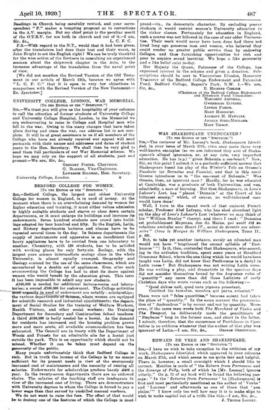WAS SHAKESPEARE UNEDUCATED ? (To use EDITOR Off THE "
SPECTATOB."3 Sus—The reviewer of Mr. Looney's book, Shakespeare Identi- fied, in your issue of March 27th, cites once more three very well-known examples (as we are informed they are) of Shake. speare's alleged ignorance, or, at any rate, very imperfect education. He has (e.g.) " given Bohemia a sea-board.'4 Now, Sir, on this point I submit it is a perfectly sufficient answer that Shakespeare based his play of the Winter's Tale on Greene's Pandosto (or Dorastus and Ruonia), and that in this. novel Greene introduces us to " the sea-coast of Bohemia." Was Greene, then, an ignorant man ? Hardly, for he was educated at Cambridge, was a graduate of both. Universities, and wee, admittedly, a. man of learning. But then Shakespeare, in Love's Labour's Lost, has " placed Dumain.' at the Court of his bitterest enemy," which, of course, no well-informed man would. have done!
Well, I turn. to the recent work of that eminent French scholar, Professor Abel Lefranc, who has shed abundant light on the play of Love's Labour's Lost (whatever we may. think of his " William Stanley " theory), and there I read: "Du.maine eat probablement Mayenne, due du Maine, qui avait 4tel en relations amicales avec Henri IV., avant de devenir son adver soire" (Sous le Masque de William. Shakespeare, Tome p. 60).
But, to. tat* yet another instance, surely an educated. man
would not. have " lengthened the second syllable of Post- humus' "I IS it, then, contended that Shakespeare, who.aocord- ing to the orthodox tradition, spent some yearn at Stratford Grammar School, where the one thing which he would have been taught was. Latin, did not know that Posthumus ie a dactyl in Latin verse ? But Shakespeare was not writing Latin verse. He was writing a play, and dramatists in the spacious days did not consider themselves bound by the, Augustan rules of "quantity" any more than did those Latinists of early Christian days who wrote verses such as the following:— "-Quod. dukes nati, quod care pignora, praestant,
Continet hie tumulus, membra qui parva retentat."
These were not " false quantities;" because accent had taken the place of " quantity." In the same manner the pronuncia- tion of " Andronkus " is by accent and not by quantity. More- over, if the same- men. wrote both The Merchant of Venice and The Tempest, he deliberately made the penultimate of "Stephens" long in the former case, and short in the latter. I submit, therefore, that the occurrence of Posthfnnus in Cym- beline is no evidence whatever that the author of that play was ignorant-of Latin.—I am, Sir, &e., GEORGE GREENWOOD.


































 Previous page
Previous page